“You must never be fearful about what you are doing when it is right.”
— Rosa Parks
Hugh McElroy was adamant:
“White folks are white folks and black folks are black folks. They should not be put at the same table when they eat.”
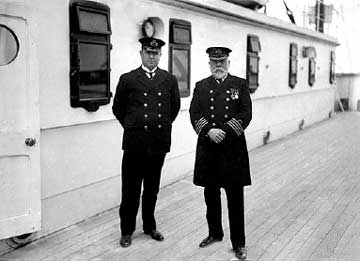
The man who would enter legend just a few years later as Chief Purser on the Titanic had created a nasty situation which would eventually require intervention by none other than Captain EJ Smith to resolve.
RMS Adriatic’s westbound voyage promised to be an uneventful and routine early summer crossing from Southampton to New York, sailing on June 14th 1910. Both passengers and crew anticipated a calm, comfortable, journey on White Star’s magnificent flagship, but a scandal ocurred which threatened to embroil the Line in infamy and serious legal trouble.
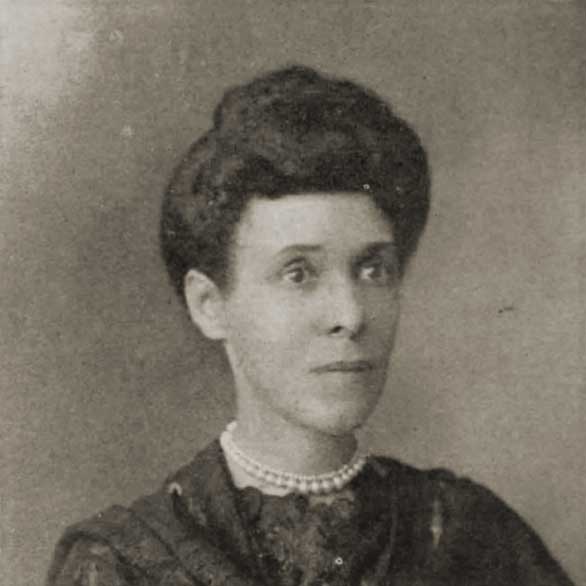
Official Souvenir Program of the National Negro Business League, Louisville, KY, 1909
Mrs. James Edward Givens, was born Fanny Rosalind Hicks in Chicago in 1872, the child of erstwhile Kentucky natives. Fanny was a stellar academic with artistic flair; she served as head of art at what is now Simmons College in Louisville, and rose to prominence as head of the art department at State University Illinois. Among her many notable achievements were portraits of eminent contemporary figures including Booker T. Washington; she also presented a portrait of John Lewis Waller to President Benjamin Harrison which was hung at the White House. A trustee of the National Association of Colored Women and suffragist, she also happened to be black. She married the esteemed Harvard graduate and language instructor James E. Givens in 1895, but sadly their marriage was curtailed by Mr. Givens’ untimely death from typhoid fever in March 1910.
Fanny had varied interests and positions, so perhaps she sought to assuage her grief by travelling to Europe in her capacity as President of the Baptist Women’s Missionary Convention of the State of Kentucky, and President of the National Council of the Sisterhood. She attended a conference in Edinburgh, and after travelling through England, France and Belgium it was now time to return home to America, so she had booked a ticket as a Second-Class passenger on the Adriatic.
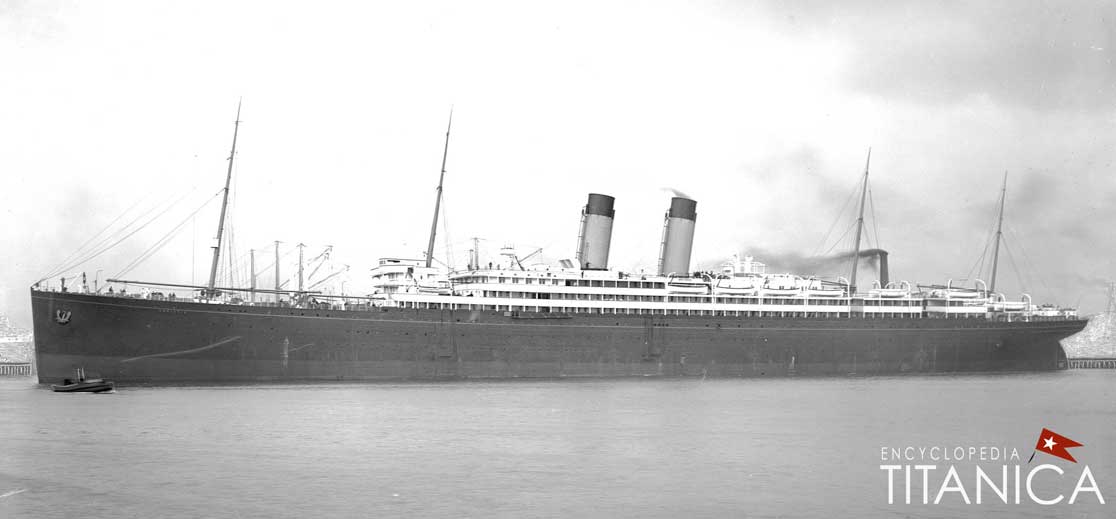
Photograph © National Museums NI, Harland & Wolff Collection
Mrs Givens relates her experience though The Colorado Statesman, 20 August 1910, prefacing her recollection with a damning statement about the Purser:
According to Mrs. Given, H.W. McElroy, the purser, was very insulting, and when she registered a protest against being “Jim Crowed” [he] declared: “White folks are white folks and black folks are black folks. They should not be put at the same table when they eat.”…
…“After visiting Scotland, England, France, Belgium and other countries abroad I boarded the steamer for home.
The first thing I met after the four small tugs had drawn the large steamer Adriatic in mid-ocean was the color-line. There were some two hundred passengers aboard and but five dark Americans, and although we occupied different parts of the line[r] at dinner we found ourselves seated at a bad table in the corner.

Photograph © National Museums NI, Harland & Wolff Collection
I noticed the discrimination and went to the steward and informed him that I did not intend to sit there at that table used by the band men and would not be Jim Crowed.
Doctor Camphor (a fellow black passenger) also protested and we were referred to the purser, who was very insulting and said that white folks were white folks and black folks were black folks and that the blacks would have to eat together.
I gave out the statement that I would not eat if Jim Crowed, and for more than two days and nights [I] refused food. I was standing out for the principle of the thing and had made up my mind to starve to death and be buried at sea rather than be mistreated because I was colored.
On the third day I asked for an interview with the captain, stating that I wanted him to give me a ruling in writing. This brought all the high officials together and I was sent for. A heated discussion ensued and I declared that I had paid for the same privileges as the white passengers and would die before I would eat food on a ship under proscription.
The captain wanted to know what terms would satisfy me, and I replied that all I wanted was to be assigned to a table with the rest of the passengers regardless of color. Orders were given that I be placed at any table in the dining room, which was done.”
At this point another ugly event transpired. Mrs. Givens was seated at “the best table” it was reported when “three Southerners” got up and left; but it seems that their action had been forgotten by the next meal, and Fanny was able to enjoy the full benefits of dining where she wished for the remainder of the voyage.
“After I had gained my point I was surrounded by many white women, who made me tell of my travels abroad. Some of them locked arms with me and we walked on deck together. I had no further trouble on board after the third day at sea.”
Who were the four other black passengers who suffered the same discrimination as Mrs Givens? It seems that three of them were fellow attendees of the Edinburgh conference, and they were returning to the United States as a group.

One is noted in the article as Dr W. Camphor, “president of the Methodist College, Alabama”. This was a misprint of the name of Dr. Alexander Priestly Camphor, an exceptional mathematician, theologian, and diplomat, with a bewildering yet glittering list of magna cum laude qualifications and achievements across multiple continents. He had the confidence of no less a figure than President Theodore Roosevelt, who appointed him as Vice-Consul General to Monrovia in 1903. Dr. Camphor was born to illiterate parents on a sugar farm in 1865. They saw his potential and arranged for him to be raised and educated by a Methodist preacher. Under the wing of his mentor, he flourished and began his meteoric rise through academia and Christian service, culminating in his work to elevate a simple Liberian seminary and high school into the College of West Africa. Although this institution has since closed its collegiate department, from its hallowed walls emerged the first female president of an African nation, Ellen Johnson Sirleaf of Liberia, who served as her country’s president from 2006-2018. Dr. Camphor’s natural curiosity saw him visiting the African Interior, and he published a book about his experiences in 1909, Missionary Story Sketches and Folk-Lore from Africa.
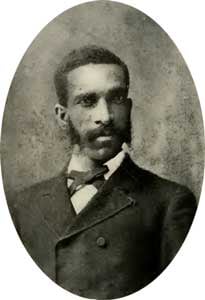
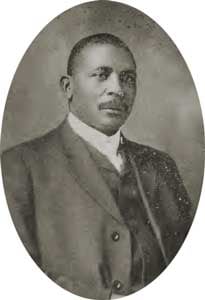
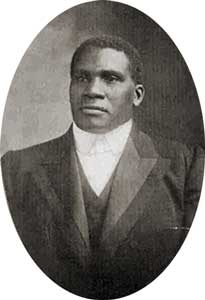
History of the American Negro and his institutions by A. B. Caldwell, Volume IV, 1919, edited 1921
The Reverend Robert P. Wyche was born in 1854 in Oxford, Mississippi and was freed from slavery with his family when he was eleven years old and his rise to eminence was similar to Dr. Camphor’s. As a teenager he worked during the day and attended night school to qualify as a teacher; he then completed a degree in theological studies in 1881 and began his ministry. His entire pastoral life was based in Charlotte, North Carolina, where as an inspirational pastor he quadrupled membership of his church and played a key role in the financing and building of the First Presbyterian Church in the 1890s. This handsome building still stands today as a lasting monument to his endeavour and it was added to the National Register of Historic Places in 1982. In 1903 he was appointed as Chairman of the Board of Trustees at Biddle University (now Johnson C. Smith University). On this 1910 trip to Europe, he had also visited Palestine and parts of Africa, travel being among his great passions. One can imagine the Reverend Wyche being a source of comfort and understanding for the recently bereaved Mrs. Givens, as his first wife had passed away in 1906. As a 1921 biography of him states: “Such, in brief, is the story of a man who though beginning life as a slave, has found the largest freedom in a life of service for others”.
The final passenger mentioned in the article by name is Reverend Peter Simon Lewis. Born in 1870, Reverend Lewis distinguished himself as Moderator of the Rowan Baptist Association, a supportive group which at the time numbered 65 churches and a total congregation of 12,000. The Association continues to flourish in the present day. Like Reverend Wyche, he lived in Charlotte.
The other black passenger was a chauffeur whose name went unreported. He was most likely travelling on a second-class ticket while his employer was berthed in first-class. It should be noted that a chauffeur in 1910 would have been skilled as a mechanic and detailer, and would not just be a driver as we consider the job today.
These were the people excluded from dining with white passengers and who were forced to sit away from them, leading one of them to the extremes of a hunger strike in protest. Once the issue was resolved, according to the Los Angeles Herald, Mrs. Givens and Dr. Camphor moved to other tables, but Reverends Wyche and Lewis remained at the table with the ships’ band and presumably the chauffeur. Perhaps this stoicism reflects the other side of the same coin – having won the right for equality on the Adriatic, did the Reverends then decide to exercise their right to continue sitting with their newfound coterie? Either way, the entire group had bravely made their point and had prevailed in the face of stark racist segregation.
It seems that some of the group were intent on bringing lawsuits against the White Star Line, but there is no evidence that this ever happened. It is unknown whether this was because of the eventual calming of heated emotion or the very understandable desire for a quiet life, especially as the profound inequity when tackling prejudice could potentially have lead to dangerous consequences. The White Star Line’s rather lame response to the furore once the story broke in the press was that “negroes [sic] were not discriminated against and that changes in seating took place on every trip, regardless of race”.
The passengers returned to their normal lives – Dr. Camphor was elected and consecrated to the office of Bishop for Africa by the Methodist Episcopal Church in 1916. He accepted honorary degrees of Doctor of Divinity from New Orleans University and Gammon Theological Seminary before his death in 1919. He is remembered “…as a great scholar, an eloquent preacher, a splendid administrator, and a man of the highest integrity and tenderest love.” He has four Methodist churches in the United States and Africa named in his honour, as well as a hall at Dillard University. Reverend Wyche remarried in 1914 and fathered two sons with his wife Sarah – he died at the grand old age of 87 in 1938. Reverend Lewis died at the age of fifty from appendicitis.
The formidable Mrs. Givens was involved in fundraising to support black artists, and also wrote songs and hymns. She was the President of the Zeta Phi Beta sorority at Howard University from 1930-33 and was the second policewoman hired by the Louisville Police Department, becoming embroiled in a furore in 1938 when she was fired along with three other female officers to be replaced by four males in a politically motivated action, even though her eleven years of work was “untiring” and “unselfish” in the “muck and grime” of the slums. As a lady of comfortable means, she continued to travel. Interestingly, she visited Europe in 1923 and sailed on the Titanic’s sister Olympic. Time can be a great healer; perhaps she had forgiven White Star for her earlier mistreatment. She died in Louisville in 1947.
The spirit of Mrs. Givens was once again felt in the halls of Howard University when Rosa Parks, Titan of the US Civil Rights Movement, gave a speech there during a celebration of her own life in 1998 – the similarities in the grit and fortitude of these two great women in times of intolerable provocation and injustice, although separated by half a century, are remarkable.
It is tempting to extend Purser McElroy and, by association, White Star a modicum of understanding given the mores of the time (as has sometimes been the case with Fifth Officer Harold Lowe’s overt racism displayed during and after the Titanic disaster), but his attitude is put into bleak perspective by the reaction of certain white female passengers who were “particularly attentive” to Mrs. Givens and who, as noted in her account, locked arms and walked on deck with her. Even if McElroy found himself in a situation where white passengers insisted on exclusion there is frankly no excusing his mortifying remarks or the fact it took three days to resolve the issue.
Captain Smith’s handling of the situation was better, and again contrasts starkly with McElroy’s. As soon as it was brought to his attention, he ordered that Mrs. Givens and her companions be allowed to sit wherever they pleased. This decisiveness could have been exercised right at the outset of the problem, and the Purser could have referred to the captain’s ultimate authority if any disgruntled passengers continued to voice their prejudice. His failure to do so is at best evidence of poor decision-making and lack of empathy, at worst outright racism and blatant discrimination. Whatever the case, McElroy more than met his match during this summer voyage.
It is to be hoped that lessons were learned from this incident, and that future White Star Passengers like the Titanic’s only black adult passenger Joseph Laroche enjoyed all the facilities and hospitality available at sea but, most of all, that they received respect and equality.
Of course, this all happened very long ago and Purser McElroy’s conduct on the night of the Titanic’s sinking was exemplary; by most accounts he was a jovial, good-humoured and well-liked man who deserves to be remembered as a major figure in the tragedy that unfolded, and for his key role in saving lives. But the human condition is multi-faceted, and this disturbing episode will shed new light on his attitude at the time and hopefully provide a new perspective on the character of this legendary Titanic crewman.
Copyright Sam Brannigan 2022

Comment and discuss